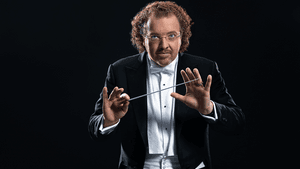Stay in the Loop
BSR publishes on a weekly schedule, with an email newsletter every Wednesday and Thursday morning. There’s no paywall, and subscribing is always free.
Stéphane Denève, Yo-Yo Ma, and Stoki the real stars here
Philadelphia Orchestra Plays Williams, Debussy and Mussorgsky

Verizon Hall was packed last weekend, no doubt because the Philadelphia Orchestra was playing music composed by John Williams. However, the most satisfying part of this concert came during the second, non-Williams half of the program.
Williams, best known for his movie scores, studied at Juilliard and knows how to write classical music. The first half of the program showcased two pieces Williams wrote specifically for a symphony orchestra.
His “Tributes! For Seiji” is a composition that’s based on a low D sounded by the whole orchestra, because, according to Williams, that note epitomizes the reverberations of Symphony Hall in Boston. He calls it “the signature pitch level of the Boston Symphony.” Seiji Ozawa, of course, was music director of that organization for 25 years. The D modulates one tone up to a low E, and the shifts between these two notes are explored for most of the piece’s 10-minute duration.
That was followed by Williams’s Cello Concerto, a piece he wrote to give Yo-Yo Ma opportunities to show off the various sounds of his instrument. It’s flashy in parts, and softly soulful in other places, as the orchestra provides a lush background.
I respect the craft of film-score writing and admire Williams’s accomplishments. With these works, he proved he also has the technical ability to write for the concert hall. Yet both of these compositions were, frankly, boring.
Saving the Best for Last
The real thrills arrived after intermission. Since the coming of Yannick Nézet-Séguin as music director in 2012, Stéphane Denève has led more Philadelphia Orchestra concerts than any other guest. Here, he showed why he deserves this attention.
As he precisely delineated the shifting chords in Debussy's "Clouds," Denève conjured the composer's image of wispy strati that move across the sky as if the wind is carrying them. His “Festivals” displayed the orchestra in a different way, with muted brass providing counterpoint to a joyous march by the string sections.
The ultimate selection, and the real crowd-pleaser, was Leopold Stokowski’s orchestration of Pictures at an Exhibition, originally written by Modest Mussorgsky as a series of piano solos. Stokowski and the Philadelphia Orchestra performed the familiar orchestration by Maurice Ravel for many years, until in 1939 Stokowski wrote a new version, which has not been heard here since he led it in 1962.
Adolph Vogel was the American agent for Ravel's publisher. Even though the Stokowski orchestration caused a drop in royalty payments to his client, Vogel told me he loved the Stokowski version. It’s more Russian, less French-sounding.
Surprisingly, this iteration is more subtle than what you might expect from the conductor who became a movie star and had a reputation for glamorizing the music he led. For example, Stokowski scored the opening for strings where Ravel had used trumpets, and the “Promenade” sections (imagining a visitor walking through the titular exhibition) are extremely soft.
Stokowski specified glockenspiel and bell chimes in other sections, and a growling tuba. The finale eliminated Ravel’s ascending brass flourishes but added the thundering sound of an organ. Denève masterfully accentuated all the contrasts.
Denève drew sounds from the orchestra that were even more impressive than what I heard at those 1962 concerts, because he was able to add instruments such as five French horns and the organ that Stokowski’s manuscript listed as “optional.” In the Academy of Music in the 1960s an organ had to be laboriously wheeled across the stage if it were to be used, so it rarely was.
This impressive version of Pictures should definitely be heard more often.
What, When, Where
Philadelphia Orchestra: John Williams, "Tributes! For Seiji" and Cello Concerto; Claude Debussy, "Clouds" and "Festivals"; Modest Mussorgsky, Pictures at an Exhibition as orchestrated by Leopold Stokowski. Stéphane Denève conductor. Yo-Yo Ma, cellist. April 27-30, 2016 at the Kimmel Center's Verizon Hall, Broad and Spruce Sts., Philadelphia. (215) 893-1999 or philorch.org.
Sign up for our newsletter
All of the week's new articles, all in one place. Sign up for the free weekly BSR newsletters, and don't miss a conversation.

 Steve Cohen
Steve Cohen